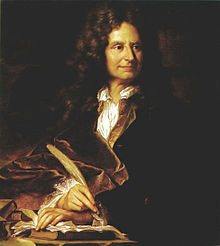Nicolas Boileau-Despréaux
Appearance
(Redirected from Boileau)

Nicolas Boileau-Despréaux (1 November 1636 – 13 March 1711), commonly called Boileau, was a French poet and critic.
Quotes
[edit]

From grave to gay, from lively to severe.
- Tant de fiel entre-t-il dans l'âme des dévots ?
- Can such bitterness enter into the heart of the devout?
- Le Lutrin (1683) I, 12
- Pour soutenir tes droits, que le ciel autorise,
Abime tout plutôt ; c'est l'esprit de l'Église.- To support Thy rights, heaven-condoned, Destroy all else; that is the spirit of the Church.
- Le Lutrin (1683) I, 185
- Let him now speak, or else hereafter for ever hold his peace.
- Épitres (1701) I, 61
- Le chagrin monte en croupe et galope avec lui.
- Trouble rides behind and gallops with him.
- Épitres (1701) V, 44
- Le temps fuit, et nous traîne avec soi :
Le moment où je parle est déjà loin de moi.- Time flies and draws us with it. The moment in which I am speaking is already far from me.
- Épitres (1701) III, 47
- Tenez, voilà, dit-elle, à chacun une écaille.
Des sottises d'autrui nous vivons au palais :
Messieurs, l'huître était bonne. Adieu. Vivez en paix.- "There, take," says Justice, "take ye each a shell;
We thrive at Westminster on fools like you.
'T was a fat oyster! live in peace,—adieu." - Epître ii, reported in Bartlett's Familiar Quotations, 10th ed. (1919); translation by Alexander Pope, Verbatim from Boileau.
- "There, take," says Justice, "take ye each a shell;
- Rien n'est beau que le vrai : le vrai seul est aimable.
- Nothing but truth is lovely, nothing fair.
- Epistle 9
- Le pénible fardeau de n'avoir rien à faire.
- The terrible burden of having nothing to do.
- Epistle 11
The Art of Poetry (1674)
[edit]
- L'Art Poétique


- Tout ce qu'on dit de trop est fade et rebutant.
- That which is repeated too often becomes insipid and tedious.
- Canto I, l. 61
- Souvent la peur d'un mal nous conduit dans un pire.
- Often the fear of one evil leads us into a worse.
- Canto I, l. 64
- Heureux qui, dans ses vers, sait d'une voix légère
Passer du grave au doux, du plaisant au sévère.- Happy the poet who with ease can steer
From grave to gay, from lively to severe. - Canto I, l. 75
- Variant: Happy who in his verse can gently steer
From grave to light, from pleasant to severe.- As translated by John Dryden
- Happy the poet who with ease can steer
- Ce que l'on conçoit bien s'énonce clairement,
Et les mots pour le dire arrivent aisément.- Whatever is well conceived is clearly said,
And the words to say it flow with ease. - Canto I, l. 153
- Whatever is well conceived is clearly said,
- Hâtez-vous lentement ; et, sans perdre courage,
Vingt fois sur le métier remettez votre ouvrage.- Hasten slowly, and without losing heart,
Put your work twenty times upon the anvil. - Canto I, l. 171
- Hasten slowly, and without losing heart,
- La vérité n'a point cet air impétueux.
- Truth has not such an urgent air.
- Canto I, l. 198
- Un sot trouve toujours un plus sot qui l'admire.
- A fool always finds one still more foolish to admire him.
- Variant A fool always finds a greater fool to admire him.
- Canto I, l. 232
- Le vrai peut quelquefois n'être pas vraisemblable.
- At times truth may not seem probable.
- Canto III, l. 48
- Chaque âge a ses plaisirs, son esprit et ses mœurs.
- Every age has its pleasures, its style of wit, and its own ways.
- Canto III, l. 374
- Un fat quelquefois ouvre un avis important.
- A fop sometimes gives important advice.
- Canto IV, l. 50
Satires (1716)
[edit]


Once we have left it, we can never return.

Embroil the earth about a fancied line;
And, dwelling much on right and much on wrong,
Prove how the right is chiefly with the strong.
- Je ne puis rien nommer si ce n'est par son nom ;
J'appelle un chat un chat, et Rollet un fripon.- I can call nothing by name if that is not his name. I call a cat a cat, and Rollet a rogue.
- Satire I, l. 51
- Il plait a tout le monde et ne saurait se plaire.
- He (Molière) pleases all the world, but cannot please himself.
- Satire I, l. 94
- N'en déplaise à ces fous nommés sages de Grèce,
En ce monde il n'est point de parfaite sagesse :
Tous les hommes sont fous, et, malgré tous leurs soins,
Ne diffèrent entre eux que du plus ou du moins.- In spite of every sage whom Greece can show,
Unerring wisdom never dwelt below;
Folly in all of every age we see,
The only difference lies in the degree. - Satire 4, l. 37
- In spite of every sage whom Greece can show,
- Le plus sage est celui qui ne pense point l'être.
- The wisest man is he who is certain he is not.
- Satire 4
- Le plus fou souvent est le plus satisfait.
- Greatest fools are oft most satisfied.
- Satire 4, l. 128
- La vertu, d'un cœur noble est la marque certaine.
- Virtue alone is the unerring sign of a noble soul.
- Satire 5, l. 42
- Si vous êtes sorti de ces héros fameux,
Montrez-nous cette ardeur qu'on vit briller en eux.- If your descent is from heroic sires,
Show in your life a remnant of their fires. - Satire 5, l. 43
- If your descent is from heroic sires,
- De tous les animaux qui s'élèvent dans l'air,
Qui marchent sur la terre, ou nagent dans la mer,
De Paris au Pérou, du Japon jusqu'à Rome,
Le plus sot animal, à mon avis, c'est l'homme.- Of all the creatures that creep, swim, or fly,
Peopling the earth, the waters, and the sky,
From Rome to Iceland, Paris to Japan,
I really think the greatest fool is man. - Satire 8, l. 1
- Of all the creatures that creep, swim, or fly,
- L'or même à la laideur donne un teint de beauté :
Mais tout devient affreux avec la pauvreté.- Gold gives an appearance of beauty even to ugliness:
But with poverty everything becomes frightful. - Satire 8, l. 209
- Gold gives an appearance of beauty even to ugliness:
- La satire, en leçons, en nouveautés fertile,
Sait seule assaisonner le plaisant et l'utile,
Et, d'un vers qu'elle épure aux rayons du bons sens,
Détromper les esprits des erreurs de leur temps.- But satire, ever moral, ever new,
Delights the reader and instructs him, too.
She, if good sense refine her sterling page,
Oft shakes some rooted folly of the age.- Satire 9
- But satire, ever moral, ever new,
- L'honneur est comme une ile escarpée et sans bords ;
On n'y peut plus rentrer dès qu'on en est dehors.- Honor is like an island, rugged and without a beach; once we have left it, we can never return.
- Satire 10, l. 167
- Et le Mien et le Tien, deux frères pointilleux,
Par son ordre amenant les procès et la guerre,
En tous lieux de ce pas vont partager la terre ;
En tous lieux, sous les noms de bon droit et de tort,
Vont chez elle établir le seul droit du plus fort.



